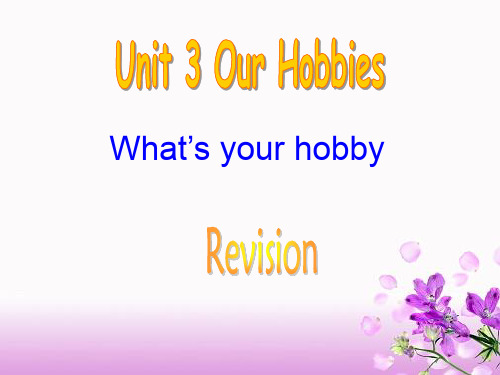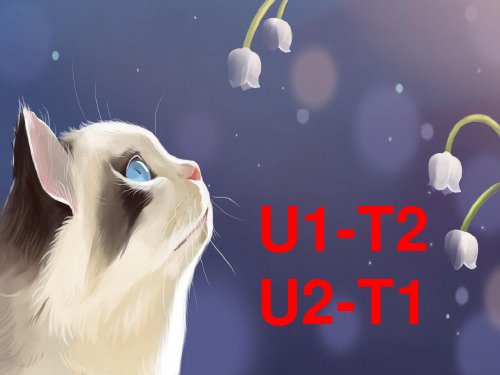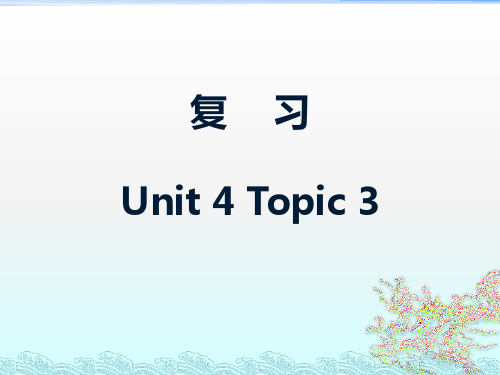仁爱英语八上复习课件(词汇+语法)
合集下载
仁爱新版英语八年级上册unittopic复习课件PPT课件

B1.prefer_____basketball to_____model planes. A.to play; make B.playing;making C.palying;make D.play;make
used to的用法
• used to "以前常作某事,过去常过某事 • ed toபைடு நூலகம்否定形式和一般疑问句形式有两种:
perferred to die instead of stealing. 他宁死也不去偷窃. • I prefer to watch TV rather than go out.我宁愿呆在家里
也不出去.
• 3.prefer sth to sth • 4.prefer doing sth to doing sth .
·福建省专用
│ 重点突破
2 whether conj. 是否 He doesn't mind whether they're good or not. 他并不介意他们是好是坏. 点拨 常用来引导宾语从句,且能与or not连用. I don't know whether I will be able to come. 我不知道我是否能来.
他们养宠物,上网聊天或收集东西,如硬币,洋娃娃或邮票. They keep pets, chat on the Net and collect things such as coins, dolls or stamps.
你过去有什么爱好 What hobbies did you use to have
1She had told me a lot about how to learn English well. 她告诉我许多有关怎样学好英语的方法. 2Thanks a lot.非常感谢. 另外,a lot of 和lots of 的意思也是许多、大量,要用在名词前,在肯 定句中常代替much,many.在口语中尤其如此.如: There are a lot of / lots of history books in the room.屋里有许多 历史书. There is still a lot of / lots of snow on top of the house.房上仍有 许多雪. a lot of和lots of之间没有多大区别,都可以与可数名词和不可数名 词连用.与不可数名词连用时,动词用单数,与可数名词连用时,动词 用复数.
仁爱版八年级上英语教材梳理复习课件

3.Are you going to join the school rowing team?你要加入学校划船队吗?(P2) 基本用法 join v.加入 1)join+sb./团体/组织,加入某人或某团体或某组织。如: I joined the English corner last week. 我上周加入了英语角。 2)join in+sth./doing sth.参加/加入某事或做某事。如: Kangkang often joins in basketball games after class. 康康课后经常参加篮球赛。
5.He arrived in Beijing with his teammates yesterday. 他和他的队友昨日抵达北京。(P7) 基本用法 arrive v.意为“到达”,后面跟宾语时,要加介词in(大地点)/at(小地 点)。如: arrive in Beijing到达北京; arrive at school到达学校。
易混词汇辨析
1.look/see/watch 1)look强调“看”的动作,意为“看,瞧”。单独使用时,用来引起对方的注 意;如果跟宾语,要和at连用。如: Look! Our teacher is coming.看!我们的老师来了。 Please look at the map.请看地图。 2)see强调“看”的结果,意为“看见,看到”。如: Can you see the words clearly? 你能看清这些单词吗?
3)watch强调“专注地看”,指“看,注视,观看”,常用于“看电视”“看球 赛”等。 如: I like watching TV.我喜欢看电视。
及时巩固 1.用look,see,watch填空 (1)It's good to see my old classmate in the street. (2)We usually watch the moon at night on Mid-Autumn Festival. (3) Look !Here comes the bus.
2022-2023学年仁爱版英语八年级上册复习课件:八上Unit 1-Unit 2

U1-T2 U2-T1
Topic 3
一、根据音标写出下列单词
1./ɪksaɪtɪŋ/
exciting
2./hɪə(r)/
hear
3./ʃæl/
shall
4./mesɪdʒ/ 5./θɪətə(r)/
message theater
6./laɪn/ line
7./mɒdn/ modern
8./əlɪmpɪks/ Olympics
7. 男子800米跑 ______t_h_e__b_o_y_s_’__8_0_0_-_m__e_te_r__r_a_c_e_____ 8. 在某方面做得差____d__o_b__a_d_ly__i_n__________________ 9. 冲过终点线 ________p_a_s_s__t_h_e_f_i_n_i_sh__l_i_n_e___________ 10. 赢得第一 _________w__in__f_ir_s_t__p_l_a_c_e_______________ 11. 轮流 ______________in__t_u_r_n______________________ 12. 能够,有能力_______b_e__a_b_l_e_t_o___________________ 13. 世界的五大部分___t_h_e__fi_v_e__p_a_r_t_s_o_f__th__e_w__o_r_ld____
9./rɪŋ/
ring
10./stænd/ stand
11./liːst/ least 12./tʃɑːns/ chance
13./fiːl/
feel
14./weðə(r)/ whether 15./ɡəʊld/ gold
16./eɪbl/ able
Topic 3
一、根据音标写出下列单词
1./ɪksaɪtɪŋ/
exciting
2./hɪə(r)/
hear
3./ʃæl/
shall
4./mesɪdʒ/ 5./θɪətə(r)/
message theater
6./laɪn/ line
7./mɒdn/ modern
8./əlɪmpɪks/ Olympics
7. 男子800米跑 ______t_h_e__b_o_y_s_’__8_0_0_-_m__e_te_r__r_a_c_e_____ 8. 在某方面做得差____d__o_b__a_d_ly__i_n__________________ 9. 冲过终点线 ________p_a_s_s__t_h_e_f_i_n_i_sh__l_i_n_e___________ 10. 赢得第一 _________w__in__f_ir_s_t__p_l_a_c_e_______________ 11. 轮流 ______________in__t_u_r_n______________________ 12. 能够,有能力_______b_e__a_b_l_e_t_o___________________ 13. 世界的五大部分___t_h_e__fi_v_e__p_a_r_t_s_o_f__th__e_w__o_r_ld____
9./rɪŋ/
ring
10./stænd/ stand
11./liːst/ least 12./tʃɑːns/ chance
13./fiːl/
feel
14./weðə(r)/ whether 15./ɡəʊld/ gold
16./eɪbl/ able
八年级英语仁爱版上册总复习资料PPT课件

2021
5
• 5. be good at (doing) sth. = do well in (doing) sth. 擅长于(做)某事 如: She is good at (playing) baseball. = She does well in (playing) baseball. (后接名词,动名)
as well
也
throw…into… 把……投进……
follow/obey the rules遵守规则
more and more people越来越多的人
instead of…
替代……
ask sb. to do sth. 叫某人做某事
build up
增进;增强
with one’s help = with the help of sb. 在某人的帮助下
• 2. Which sport do you prefer? = Which sport do you like better? 你更喜欢什么运动? I prefer skating. = I like skating better. 我更喜欢滑雪.
• 3. Do you skate much? = Do you often skate? 你常滑雪吗? • 4. She spends at least half an hour in the gym every day.
一般疑问句:Will you/she/he/they go to play baseball soon?
回
答:Yes, I/she/he/they will. No, I/she /he/they won’t.
• (三)动词plan, come, go, leave, fly等用现在进行时表示将要发生的事. 如: I’m coming. 我就来。 He is leaving for Shanghai. 他将到上海去。 We are going to Beijing. 我们将去北京。
八上仁爱英语复习课件Unit 2 Topic 3

七、短文填词。 阅读下面短文,根据语境、音标或单词提示,在每个空格内填入一个恰当的 词,要求所填的词意义准确、形式正确,使短文意思完整、行文连贯。 “I must see the patient(病人). _H__o_w_ can I go back without seeing the patient? ” “There is no patient, ” the woman explained(解释). “No one is ill. I live here. I must get home from a town, but there is no _t_a_x_i_/'tæksi/ at this time of the night. You see, a doctor often makes night calls, so excuse me. Here is money. Thank you, Doctor. Good night. ”
Miss White often _t_ea__ch_e_s_ _h_e_r_se_l_f_ drawing in her free time. 5. 每个人应该拒绝酒后驾车。
Everyone should _s_a_y_ __n_o_ _t_o__ driving after drinking.
三、重点语法。
c_r_o_w__d_e_d_(crowd) there.
二、重点句型。 根据中文提示完成下列句子。 1. 王医生现在很忙,请一会儿打电话给他。
Doctor Wang is busy now, please _r_in_g__ _h_im__ _u_p_ later. 2. 他想知道是否可以留个口信。
Section C
八上仁爱英语复习课件Unit 4 Topic 3

they think it’s too difficult.
二、重点句型。 根据中文提示完成下列句子。 1. 足球是世界上一项受欢迎的运动,数以百万计的人为了娱乐和锻炼而踢
足球。 Football is a popular game in the world, and _m__i_ll_io_n_s_ _o_f_ people play it for fun and exercise. 2. 他是如此之累以至于再也走不动了。 He was so tired that he can’t _g_o_ _o_n_. 3. 当你试图让哭泣的婴儿高兴起来时,可以做鬼脸。 When you try to cheer up a crying baby, you can _m__a_k_e_ _fa_c_e_s_.
七、短文填词。 阅读下面短文,根据语境、音标或单词提示,在每个空格内填入一个恰当的 词,要求所填的词意义准确、形式正确,使短文意思完整、行文连贯。 In many countries, people c_e_l_e_b_r_a_t_e_/'selɪbreɪt/ Screen-Free(无屏幕) Week. It is on the first week of May every year. It asks people to turn _o_f_f_ screens during the week. Some people say _tu__rn__in_g_(turn) off tech devices(技术设备) is good for kids. According to a study, kids sleep better and get _b_e_tt_e_r_(good) grades when their parents control their screen time. Also, some people think Screen-Free Week can help kids develop(发展) a good habit. They point out that many kids who _t_o_o_k__(take) part in the event in the past, now spend less time _u_s_i_n_g_(use) tech devices.
二、重点句型。 根据中文提示完成下列句子。 1. 足球是世界上一项受欢迎的运动,数以百万计的人为了娱乐和锻炼而踢
足球。 Football is a popular game in the world, and _m__i_ll_io_n_s_ _o_f_ people play it for fun and exercise. 2. 他是如此之累以至于再也走不动了。 He was so tired that he can’t _g_o_ _o_n_. 3. 当你试图让哭泣的婴儿高兴起来时,可以做鬼脸。 When you try to cheer up a crying baby, you can _m__a_k_e_ _fa_c_e_s_.
七、短文填词。 阅读下面短文,根据语境、音标或单词提示,在每个空格内填入一个恰当的 词,要求所填的词意义准确、形式正确,使短文意思完整、行文连贯。 In many countries, people c_e_l_e_b_r_a_t_e_/'selɪbreɪt/ Screen-Free(无屏幕) Week. It is on the first week of May every year. It asks people to turn _o_f_f_ screens during the week. Some people say _tu__rn__in_g_(turn) off tech devices(技术设备) is good for kids. According to a study, kids sleep better and get _b_e_tt_e_r_(good) grades when their parents control their screen time. Also, some people think Screen-Free Week can help kids develop(发展) a good habit. They point out that many kids who _t_o_o_k__(take) part in the event in the past, now spend less time _u_s_i_n_g_(use) tech devices.
仁爱英语八年级上册知识点PPT课件
3
Unit 1 Playing Sports
Topic 1Are you going to play basketball?
7. at least
至少
8. be good at
善于做某事
9. take part in
参加
10. all over the world
全世界
11. be good for
[类似的有watch,hear,feel 等这类感观 动词.]
7
重点语言点
20. join sb. 表示 “加入某人的行列” “和某 人在一起”
join + 组织 表示 “加入某个组织” take part in 表示 “参加/出席某个活动” 如: Will you join us? I will join the skiing club. She is planning to take part in the high
I prefer skating. = I like skating better. 我更喜 欢滑雪.
15. Do you skate much? = Do you often skate? 你常滑雪吗?
16. She spends at least half an hour in the gym every day. 每天她至少花半小时在体育馆.
jump.
8
重点语言点
21. leave… 离开…… leave for… 动身去…/离开到… 如: They are leaving Beijing tomorrow.
明天他们要离开北京. They are leaving for Japan the day after
tomorrow. 后天他们要前往日本. 22. how long 表示“多久(时间)”; 提问时
仁爱版八年级英语上 Unit 2 Topic 1 (复习课)教学课件 (共24张PPT)
→ 2)No, you/we don’t have to.
No, you/we needn’t
二.重点词组: 二.重点词组:
1. 对……有益/害 1. be good for ……
对……有/害
be bad for......
2. 好的习惯
2. good habits:
1)早睡早起
1) go to bed early and get up early
Shall I take you to the hospital? 8. 医生觉得病人不怎么严重,他会这样说:
It's not serious. / Nothing serious. 9. 这是药(药片)。
Here are the pills. 10. 一次两片,一天三次。
Take tow pills, three times a day.
1) 努力学习对我们来说是很重要的。 It’s necessary for us to study hard.
2)他很难完成这项工作。 It’s difficult for him to finish the work.
3)阅读是很有趣的。 It’s interesting to read.
3. 吸烟对我们的健康有益还是有害?
二、重点词句: 1. don't look well 2. have a (bad / terrible) cold 3. have a headache
have a cough have a fever have a toothache have a backache have a stomachache 4. have the flu 5. have sore eyes 6. a sore throat 7. leg hurts 8. can’t sleep well 9. feel terrible / tired
仁爱英语八年级上册期末复习PPT课件
12
多音节词和部分双音节词
在词前加more或most eg: beautiful--more beautiful-most beautiful
serious--more serious--most serious
13
写在最后
经常不断地学习,你就什么都知道。你知道得越多,你就越有力量 Study Constantly, And You Will Know Everything. The More
回答:Yes, I was./ No, I wasn't
5
感 叹 句 篇
6
感叹句:表示喜怒哀乐等强 烈情感的句子
构成:1. What+a/an+(形容词)+单数可数 名词+主语+谓语!
eg: What a beautiful girl ! 2.What+(形容词)+可数名词复数或不 可数名词+主语+谓语!
eg: What beautiful girls ! What sweet music !
what用于修饰形容词短语 7
构成:3. How+形容词(副词)+主语+ 谓语!(how用来修饰形容词、副词或 动词。)
eg: How ugly! How quickly the boy is writing
8
比 较 篇
9
形容词的比较等级
形容词的三个比较等级:原级,即原形;比 较级、最高级。 表示两者的比较时用比较级 He is taller than him. 他比他高。 表示三者或三者以上中“最……”时,用最 高级。 He is the shortest of the three. 他是三 人中最矮的。
多音节词和部分双音节词
在词前加more或most eg: beautiful--more beautiful-most beautiful
serious--more serious--most serious
13
写在最后
经常不断地学习,你就什么都知道。你知道得越多,你就越有力量 Study Constantly, And You Will Know Everything. The More
回答:Yes, I was./ No, I wasn't
5
感 叹 句 篇
6
感叹句:表示喜怒哀乐等强 烈情感的句子
构成:1. What+a/an+(形容词)+单数可数 名词+主语+谓语!
eg: What a beautiful girl ! 2.What+(形容词)+可数名词复数或不 可数名词+主语+谓语!
eg: What beautiful girls ! What sweet music !
what用于修饰形容词短语 7
构成:3. How+形容词(副词)+主语+ 谓语!(how用来修饰形容词、副词或 动词。)
eg: How ugly! How quickly the boy is writing
8
比 较 篇
9
形容词的比较等级
形容词的三个比较等级:原级,即原形;比 较级、最高级。 表示两者的比较时用比较级 He is taller than him. 他比他高。 表示三者或三者以上中“最……”时,用最 高级。 He is the shortest of the three. 他是三 人中最矮的。
仁爱英语八上复习课件(词汇 语法).ppt
Unit 3 Topic 1
重点词汇: (单词表) hobby collect friendship stupid provide stick---stuck be fond of
• 喜欢做…… • like / love / enjoy doing sth. • =be fond of doing sth
• 对某人来说是特别的 • be special to sb
used to do sth.过去常常做某事
• 肯定句: • used to +动词原形 • 我过去常常跟我老妈去逛街。 • I used to go shopping with my mother. • 否定句: • didn’t use to do sth./ Usedn’t to do sth. • I usedn't to go shopping with my mother. • I didn't use to go shopping with my mother. • 一般疑问句: • Did sb use to do sth ? • Did you use to swim in summer? • Yes, I did. • No, I didn’t.
我不介意
I don’t mind it.
日常生活
everyday life = daily life
在……中流行
popular with sb
感 叹 句 篇
感叹句:表示喜怒哀乐等强 烈情感的句子
构成: 1.What+a/an+(形容词)+单数可数名词
+主语+谓语! eg: What a beautiful girl !
在一个下着雨的早上 on a rainy morning
- 1、下载文档前请自行甄别文档内容的完整性,平台不提供额外的编辑、内容补充、找答案等附加服务。
- 2、"仅部分预览"的文档,不可在线预览部分如存在完整性等问题,可反馈申请退款(可完整预览的文档不适用该条件!)。
- 3、如文档侵犯您的权益,请联系客服反馈,我们会尽快为您处理(人工客服工作时间:9:00-18:30)。
3. How + 形容词(副词) +主语+谓语! (how用来修饰形容词、副词或动词。) eg: How ugly!
How quickly the boy is writing.
打油诗一首:
what和how, 怎么选? 感叹句,往后看,看看有没有形容词。 形后如果是名单,就用what a或what an 若是名复或不可数,也是用what就OK。
• 在某人业余的时间 • 电影迷 • 看电影
• • • • • • • • • • • •
• in one’s free time • . a movie fan =. go to the movie theater = see a movie = watch movies • go out (for a walk ) 出去(散步) • take sb/sth out for a walk 带……出去散步 • walk a pet dog 遛狗 • keep pets 养宠物 • collect stamps 集邮 • learn about…from… 从…….中学习关于…… • more than 超过 • start with … 以……开始 • cut out 剪下 • share sth with sb 与…..分享…… • provide sb with sth 给.某人提供某物 • / provide sth for sb 对某人来说是特别的 • be special to sb
used to do sth.过去常常做某事
• • • • • • • • • • • • • 肯定句: used to +动词原形 我过去常常跟我老妈去逛街。 I used to go shopping with my mother. 否定句: didn’t use to do sth./ Usedn’t to do sth. I usedn't to go shopping with my mother. I didn't use to go shopping with my mother. 一般疑问句: Did sb use to do sth ? Did you use to swim in summer? Yes, I did. No, I didn’t.
• 主语+谓语+宾语+宾补 • make sb / sth +adj. • make sb.do sth. • make sb. +职位、名衔 • let sb. do sth. • keep sb. +adj. / doing • ask/tell sb. to do sth. • hear / see sb. do/doing sth.
跑出 (房间) • • 保持冷静 • 搭乘电梯 • 下楼 • 在…..的中间 关掉(电源,水龙头等) • 跳出窗口 • 远离; 避开
Unit 4 Topic3& review
• 重点词汇: • 单词— online result search correct • pleasure knowledge 词组— face to face look up on the Internet • 在互联网上 • 你还能做什么? what else can you do ? send emails • 发电子邮件 find out • 找出,查明 come into being • 形成 • (将来的)某一天 some day make it into use • 投入使用 • 沉迷于…; 专心专注于… lose oneself in …
On a new year’s Eve. 在除夕夜 on the morning of 在……的早上 在一个下着雨的早上 on a rainy morning on that day 在那天 at this/that time 在这/那时 in the early 1800s 早在十九世纪初 in the 1980s 在20世纪80年代 in 1988 在1988年 By 1930 到1930年为止
句型转换
• Used to do He used to listen to folk music. He used not to listen to folk music. 否定句: He didn’t use to listen to folk music. 一般疑 Did he use to listen to folk music? 问句 Yes, he did. No, he didn’t.
Unit 3 Topic2
重点词汇(单词表): concert wonder peace culture own what a pity! 音乐类型:( Types of Music) classical pop (country, rock, jazz) folk music 乐器:( Musical Instruments) the Violin, the piano, the guitar, the drums, the erhu,
1.他以前经常游泳,但他现在却常常踢足球。 He used to swim a lot, but now he often plays football. 2. 她现在长得很高,但是她以前是挺矮的。 She is tall now, but she used to be short. 3.我爸爸以前是个农民,但他现在是一个厨师。 My father used to be a farmer, but now he is a cook.
仁爱英语八年级上册
期末复习课件
Unit4 topic1
• 1. 重点词汇 (单词表) cover control surface nature reason protect thousands of die out feed on less and less in danger 2. think of 认为 think about 考虑/思考 chat with sb. 与……聊天 run after… 追赶…… live a … life 过上……生活 share… with… 与……分享…… provide sb. with sth = provide sth. for sb. 为某人提供某物 be important to sb. 对某人来说是重要的 play an important part in sth. 在……中起着重要的作用
Unit 3 Topic 1
重点词汇: (单词表) hobby collect friendship stupid provide stick---stuck be fond of
• 喜欢做…… • like / love / enjoy doing sth. • =be fond of doing sth • 对……有兴趣 • =be interested in doing • 更喜欢做…… • =prefer doing sth. • 讨厌做…… • hate doing sth.
advice, work ,homework, progress, news, time, weather, knowledge,
traffic , information, fun, music, space
Unit 3 Topic 3
重点词汇: (单词表) serve, museum, agree with sb. voice, burn, however, solve, laugh beat---beat wake--- woke
ห้องสมุดไป่ตู้
语法三:过去进行时
1.概念:A:表示在过去某一时刻或某一段 时间内进行或发生的动作。 B:过去某段时间内持续进行的动作。 2.结构为:was /were + V-ing 。 3.常与表示过去的时间状语连用,如: at this/that time yesterday/last night/ last Saturday, from 1;00 to 2:00 yesteday 等;或 者与when, while, as引导的过去时间状语连用。
形后如果不是名, 或者无形又无名, 而跟副词或是句子,只选how就可以了。
常考的不可数名词有: 长头发的Lily用钱买家具面包布纸。 她建议作业要按时做,工作要有进步, 在新闻时间, 看天气知识, 交通信息,听趣味音乐,上QQ空间!
hair , money, furniture, bread, cloth, paper.
Unit4 Topic2
• 1. 重点词汇 Strike --- struck shake --- shook understand --- understood send --- sent rebuild --- rebuilt 2. another two terrible earthquakes 另外两次地震 another +数量+名词复数 另外的…… 再多…… another two apples 另外的两个苹果 another + 名词单数 另一…… 如:another apple 3. 词组: lose one’s life 丧命 保护…免受…(的伤害) protect … from… hear about / of 听说 hear from sb. 收到某人的来信
• • • • • • • •
run out of (the room ) Stay/keep calm take a lift go downstairs in the middle of turn off jump off a window stay away from = get/ keep away from with one’s help • 在……的帮助之下 = with the help of sb. return… to… • 把……归还给…… return to … • 回到……
